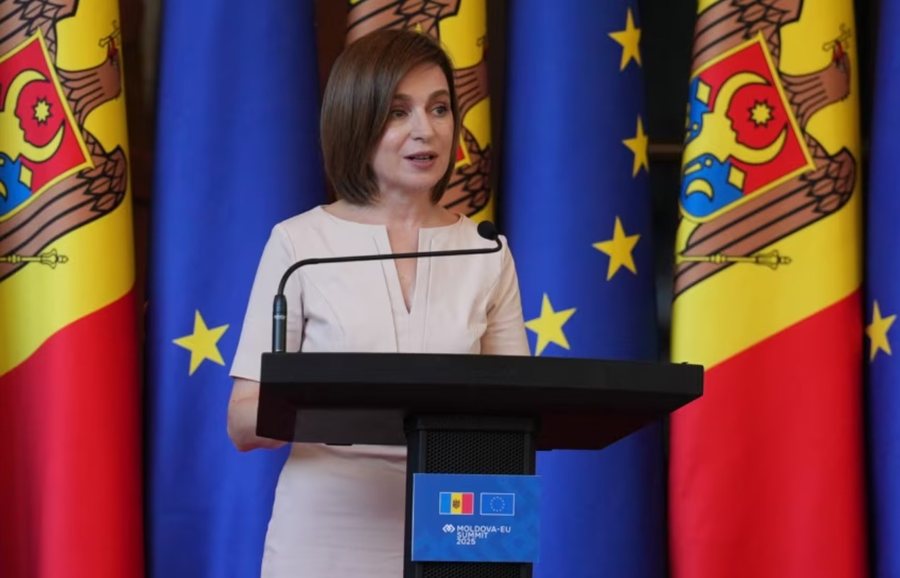
Moldovan President Maia Sandu said after a meeting of the Supreme Security Council on July 30 that Russia aims to “control” Moldova by interfering in the September 28 parliamentary elections. She warned that Moscow is preparing political tools to influence the outcome and gain a majority in the new parliament. Kremlin spokesman Dmitry Peskov responded curtly that “Russia does not interfere in the affairs of any country.”
At the press conference after the council meeting, the head of state stated that the Kremlin will use several "political instruments" to increase its chances of securing a majority in the Chisinau Parliament, following the September 28 parliamentary elections.
She said these are grouped into the so-called "sovereignist current", which promotes "a development alternative for Moldova", along with Euroscepticism.
She also mentioned the "populist-aggressive current" of the Shor criminal group, which uses vote-buying schemes, recruits violent individuals for paid protests against the government, and involves organized crime groups to vandalize state institutions.
The President said that one of the objectives is to reduce diaspora participation in voting, through provocations and electoral corruption.
Authorities plan to open a record number of nearly 300 voting centers abroad.
In the Transnistria region and the Gagauzia autonomy, voters will be transported to polling stations in an organized manner, while another energy crisis could erupt before the elections, she added.
Sandu warned citizens that they could be punished for buying or selling votes and participating in paid protests.
Paid protests and the involvement of the Church
The President of Moldova, Maia Sandu, also warned about the involvement of new political projects that, according to state institutions, target the moderate pro-European electorate.
"The political side supported by the Russian Federation includes independent candidates who are not directly controlled, but are indirectly supported. This poses a threat to the country's security and sovereignty," she stated.
So far, 13 people have approached the Central Election Commission to obtain lists for the purpose of collecting signatures for independent candidacy in the September 28 parliamentary elections.
According to Sandu, Russia uses a variety of tools to influence the electoral process, including illegal financing, money laundering, disinformation, cyberattacks and paid protests. She added that through cryptocurrencies alone, Moscow plans to bring about 100 million euros to Moldova in the near future.
Another target of the intervention, according to her, is justice, where the Shor group is trying to corrupt judges to block criminal files and undermine citizens' trust in state institutions.
The president also said that Moscow will use the Church to spread fear and radicalize various categories of the population, citing the pilgrimages of priests of the Moldovan Metropolis to Russia, held last fall before the presidential elections.
Sandu calls for more communication and response to disinformation
Moldovan President Maia Sandu said that state institutions, in particular the Center for Strategic Communication and Combating Disinformation, should communicate openly with the public about Russian propaganda lines and, in cooperation with other institutions, react immediately to fake news, informing society in a quick, clear and transparent manner.
She announced that talks are currently underway with the social network TikTok and the company Meta, which owns Facebook and Instagram, to combat the spread of misinformation and fake news.
"There is no response from Telegram when state institutions report fake news or actions aimed at corrupting voters on this platform," declared President Sandu.
She predicted that in the coming weeks Moldova will face "extraordinary, well-organized and heavily funded interventions", as well as the involvement of "criminal groups".
"Elections must be free and fair. Moldova must decide for itself," emphasized President Sandu.
On the same day, at a press conference in Bucharest, Romanian President Nicusor Dan said his country was ready to assist Moldova during the elections, without interfering politically, by providing technological expertise, particularly in the field of cybersecurity. He called the September 28 elections “important, including for Europe,” and echoed concerns from the Chisinau authorities that Russia might try to influence their outcome.
Reactions from the opposition: Accusations of division and suppression of critics
The Mayor of Chisinau, Ion Ceban, one of the leaders of the “Alternative” electoral bloc – formed together with the parties of former Prime Minister Ion Chicu, former presidential advisor Mark Tcacicuk and former presidential candidate Alexandr Stoianoglo – described President Maia Sandu’s statement as “hysterical” and accused her of dividing citizens “into her supporters and enemies of the country”.
In a video message published on social media, Ceban claimed that some state institutions are being used to "suppress" critical voices and stated that the authorities intend to prohibit them from participating in the parliamentary elections.
"A new idea is being worked on: to personally ban me from running in the parliamentary elections," Ceban declared. /REL (A2 Televizion)











